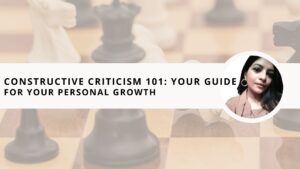How to be more empathetic? Why is it necessary at all? What makes it an important skill to possess? How does it improve your well-being? Today, in this blog we will find answers to all these and many other relevant questions, let’s go!
Usually, people confuse empathy with weakness when the truth is just the opposite. Empathy doesn’t make you weak, it doesn’t make you any less than others. Instead, it reflects your higher emotional intelligence. It shows your emotional strength. This is why it’s such a rare skill to possess.
Once I was on a call with a client and he complimented me with something that gave me a new realization. He said, “You’ve got a gift to be warm and friendly with people. Not everyone has it in them. And, it’s not something that you can learn. You either have it or you don’t.”
While this was the sweetest thing anybody has ever said to me, it also made me notice my behavior with the people around me, especially the people I work with.
One thing I swear by as a service provider is to ease my client’s burden in every way I can through my work. That is one principle I follow for the people I work with. And I get it from my parents and family. I have always seen my parents, my grandparents, and my elders in the immediate family as being a helping hand to people in need.
So, one thing I am sure about being empathetic is that you get it from the people you surround yourself with. Empathy is a powerful skill. It lets you understand and share the feelings and experiences of others. It plays a crucial role in building successful relationships, fostering communication, and creating a sense of belonging and connection with others.
As you continue to build your life and “hustle” for your dreams in this digitally connected world, your personal connections can often feel distant. This makes developing empathy more important than ever. Thus, in this article, you will understand the meaning of empathy in depth. Also, I will share some actionable and practical tips from my personal experiences that will help you on your way to learning how to be more empathetic and build more meaningful connections in your personal and professional life.
How to be More Empathetic? 5 Simple Tips That Will Help You
Let’s unveil the learning layers peel by peel and start from the beginning to understand the meaning, importance, and implementation of empathy in life.
Why is Empathy Important? The Power of Empathy
Empathy is your capacity to understand, share and relate the other people’s emotions. It is often accompanied by a sense of compassion towards others.
It is an essential social and emotional skill that helps you to establish genuine connections in life. It persuades you to communicate effectively while demonstrating care and concern for others.
Whether you are a leader, a parent, or a friend, empathy can enhance your ability to connect with others and build stronger, meaningful relationships.
Why Being Empathetic Matters? How can I increase my Empathy?
In this increasingly interconnected world, it is inevitable to question your and others’ empathetic skills. Yes, the digital age has brought people closer together in many ways, but it has also created a sense of distance and disconnection.
Learning how to be more empathetic gives you a path to bridge that gap and form genuine connections with others.
When you empathize with someone, you’re not only understanding their emotions but also you’re making them feel seen, heard, understood, and valued. And in a world where everyone is so busy catering to their own dramas and dreams, this is a skill that sets you apart from the crowd. Because you give people a reason to confide in you. This is why it can have such a profound impact on your relationships, both personally and professionally.

What causes lack of Empathy?
While empathy is a crucial skill to develop, not everyone is eager and comfortable to learn or practice it. As I said, everyone has so much going on in their lives. Sometimes the thought of being there for others may not even cross your mind because you’re too busy cleaning your own mess.
There can be several levels to being empathetic. In most cases, you don’t completely lack it. It’s just absent at the moment because you might have your attention on something “more important”.
For example, I had a friend in high school. We were like the best friends you could ever think of. But, we grew apart as life moved on. There was so much water under the bridge, so much past nuisance from both sides that it just felt “right” to let that friendship go. And that is what we did.
But, it ended for real when she lost one of her family members and I couldn’t be there for her. Because my family went through something very humiliating and traumatizing at the same time. And I chose to be with my parents because I knew she had so many people to take care of her but my parents only had me and my brother.
So, just because you lack empathy in one situation that doesn’t make you a bad person. Empathy is an ability, a skill, that makes you feel connected to others. Just because you didn’t feel that connection with one person, doesn’t prove that you will feel like this always, in every situation.
However, here are 6 signs that reflect your lack of empathy:
- You think it won’t happen to you
- You’re overcritical and judgemental
- You think other people are “too sensitive”
- Your response may involve jokes about the situation
- You don’t understand how your behavior affects others
- You always find it difficult to maintain your relationships
Empathy v/s Sympathy
Before we dive into how to be more empathetic, it’s essential to understand the difference between empathy and sympathy.
Sympathy and empathy are a few of those terms that are often used interchangeably because people fail to understand their actual meanings.
Sympathy involves feeling sorry for someone or pitying their situation from a distance. Empathy, on the other hand, goes beyond pity. It means you put yourself in someone else’s shoes and truly understand and feel their emotions. This is why it requires you to follow these 5 tips if you wish to learn how to be more empathetic in everyday life.
How to Be More Empathetic in Everyday Life? 5 Tips to learn it
Now that you’ve understood the meaning and importance of empathy, it’s time for us to explore five practical tips that will help you to develop this skill and build more meaningful connections in life:
Tip #1: Active Listening
One of the most effective ways to be more empathetic is to become an active listener. In today’s fast-paced world, you will often find yourself eager to share your thoughts and opinions while failing to listen to others.
Actively listening means giving your undivided attention to the speaker, maintaining eye contact, and giving responses that show that you are fully engaged in the conversation. It means that you respect the person enough to avoid any distractions like cell phones or computers. It means you’re focused on understanding the other person’s perspective.
To become a better listener, try the following steps:
- Commit your undivided attention to the conversation.
- Don’t interrupt and let the speaker finish their thoughts.
- Allow the person to express their emotions and vent without judgment.
- Summarize your understanding of what you just heard and ask if you’re right.
- Ask insightful and non-judgmental questions to gain a deeper understanding of their perspectives.
Remember, you don’t become an active listener by just hearing their words. You must also be understanding their emotions and experiences to make them genuinely feel heard so they feel better overall.
Tip #2: Express Your Perspective
After actively listening to someone, you can practice empathy by sharing your perspective on their situation. You don’t necessarily have to dismiss their feelings or try to solve their problems. Instead, just acknowledge their emotions and show your understanding.
Don’t confuse this as an opportunity to share your miseries or go like, “Oh! Yes. You know something similar happened to me too and it was…” That’s not how you empathize with others. This shows you neglecting everything they said and taking over the focus on your situation, which is not the right way to do it.
Instead, you can say things like:
- “I can imagine that must be really tough for you.”
- “I can see that you’re going through a difficult situation, and I’m here for you.”
- “It’s hard for me to fully grasp what you’re going through, but I want to understand and support you.”
By expressing your perspective in these ways, you validate their emotions and let them know that you are there with them in this tough time.
Tip #3: Step Into Others’ Shoes
To truly understand and empathize with others, it’s important to step out of your own world and try to experience life from their perspective and point of view. This can be done through various activities, such as:
- Volunteering in communities or organizations that serve different populations.
- Engaging in cultural experiences or attending events outside of your comfort zone.
- Reading books or watching movies that explore diverse perspectives and experiences.
- Starting conversations with strangers or getting to know colleagues and neighbors better.
- Following people on social media who have different backgrounds, beliefs, or political views than yours.

By putting yourself in different and new environments and seeking to understand others’ viewpoints, you can broaden your own opinions and develop a greater sense of harmony. This makes you more empathetic because it opens a new world to new perspectives, which gives you clarity of thought in several other situations.
Tip #4: Collaborate on Shared Causes
Working together on shared projects or causes can be a powerful way to foster empathy. Collaborating with others from different careers and diverse backgrounds allows you to learn from their expertise, understand their experiences, and build connections based on common goals.
Whether it’s volunteering in a community garden, participating in political organizing, joining a committee at your place of worship, or finding opportunities to work together, all these are great ways to overcome your mental barriers and promote empathy in your life.
Tip #5: Acknowledge and Address Your Biases
All of us have biases. Everyone has perspectives and people they support or oppose. But, acknowledging these biases is an essential step towards becoming more empathetic.
Recognizing your own biases requires introspection and self-reflection. It’s important to question your assumptions, challenge your generational stereotypes, and actively seek out different perspectives. By being aware of your biases and actively working to overcome them, you can cultivate a more empathetic mindset.
Conclusion
Remember that developing empathy is a continuous process. It’s not something that’s done once and you don’t have to do it again.
Being empathetic takes time and effort to understand and connect with others on a deeper level. But the lifelong rewards are worth all the conscious efforts you put in to learn how to be more empathetic – stronger relationships, improved communication, and a greater sense of community.
Empathy is a skill that can be developed with practice and intention. So why not start today and make a positive impact on the people around you?
I’d love to hear your views about being empathetic in the comment section.
I hope you’re having a good time reading my blog.
Until next time,
I’ll see you soon.



